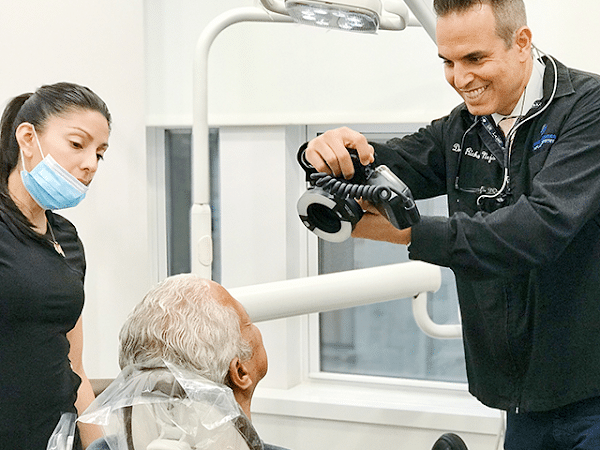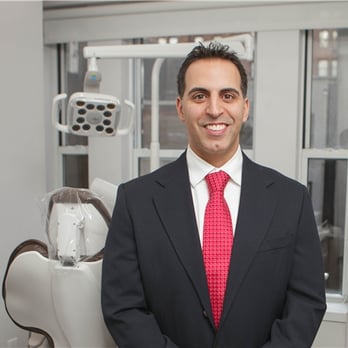Checkout Dr. Richard Nejat, DDS Watch Video
Dr. Richard Nejat is a board-certified periodontist offering leading-edge dental implant placement and gum surgery techniques. Dr. Nejat has completed many years of advanced training at highly recognized medical institutions and is a member of numerous leading professional organizations. Recognized as a foremost New York dental implants provider, Dr. Richard Nejat is frequently invited to lecture at professional seminars and symposiums.
Dr. Nejat attended college at Drew University and continued his education at New York University where he attained his Doctorate of Dental Surgery. Dr. Nejat was elected to membership in the prestigious Omicron Kappa Upsilon, The National Dental Honor Society recognizing academic and clinical excellence in dentistry. Dr. Nejat completed a three-year residency in Periodontics and Dental Implants, earning his certificate in Periodontics from The State University of New York at Stony Brook University. Dr Nejat is currently Clinical Assistant Professor in the Department of Implant Dentistry & Periodontics and Full-Mouth Rehabilitation CE Course at New York University. He is also is Clinical Assistant Professor in the Department of Implant Dentistry & Periodontics at Stony Brook University In addition to his professorship at New York University and Stony Brook University, Dr. Nejat maintains private practices in Manhattan and Nutley, New Jersey.
Dental Implants
The implants are placed under the skin and into the bone at the first surgical appointment. This surgical appointment is performed in the dental office under local anesthetics with or with out oral sedation. The dental implants are allowed to heal for a period of two (2) to six (6) months. After this healing time the implants are exposed at a brief second surgical appointment prior to placing a post inside. The post becomes the extension to which a crown is attached. The total process tends to take a period of four (4) to seven (7) months.
Dental implants utilize small anchors made of a biocompatible metal called titanium, which are placed in the jawbone. Titanium does not decay and does not need root canal therapy. The anchors become securely embedded in the jaw as the bone grows around them over the first few months. Abutment posts are inserted into the anchors and carefully crafted replacement teeth are permanently attached to the posts, providing the recipient with natural looking and feeling teeth.
Our team of cosmetic dentists are extremely well trained and very experienced with dental implants. We stay abreast of the very newest dental implant technologies, and no other dental center in the Long Island or Queens area of New York can surpass our expert technique.
Why Dental Implants
As highly experienced NYC & Long Island dental implants providers, the dentists of Advanced Periodontics & Implant Dentistry recognize the importance of an attractive smile. One or more missing teeth can cause functional problems, lead to further tooth loss, and lower the patient’s self-confidence and self-esteem. In order to resolve these concerns, our dentist offer several leading-edge dental implant procedures. In addition, they perform advanced gum surgery techniques for patients seeking the help of a skilled periodontist.
Though traditional dentistry has given us many options for treating patients with missing teeth like bridges and partial or full dentures, dental implants are a proven solution for people in good overall oral and systemic health who have lost one tooth or have lost or are missing several teeth due to periodontal gum disease, trauma or injury, or any other reason. This is because dental implants are one of the most predictable and conservative ways of replacing missing teeth with the best long term success. Due to their unmatched stability and longevity, dental implants are by far the best and most stable long-term tooth replacement option.
What are Metal-free dental implants?
Metal-free (also known as Zirconia implants or all-ceramic implants) are one of the best materials available today for dental reconstructions. Zirconia is a lightweight metal, that is incredibly strong – and resistent to bending, making it an ideal material for dental implants. Its bright-white, tooth-like color makes it all the more suitable for tooth replacement.
Zirconia has many advantages over other dental implants materials. Among the advantages of Zirconia Implants are that it’s:
- A naturally-occuring material
- Absolutely Metal-free
- Highly aesthetic, due to its white tooth-like color
- Proven to be more hygienic than metal options
- Extremely strong
- Biocompatible (does not cause allergies)
- Readily accepted and integrated by the surrounding bone, leading to successful implants, and permanent stability of teeth.
Bonded Bridge
Another option to replace a single tooth is a resin-bonded bridge, known as a Bonded Bridge or a Maryland Bridge. To place a bonded bridge, a high-speed drill is used to cut into the back of the neighboring teeth. A prosthesis is then added to the back of your natural teeth. The prosthesis fills the visible space of the missing tooth, but with the absence of the natural tooth root, the bone above the crown begins to shrink. Everyday biting forces will also begin to apply opposing pressures that will loosen the bond over time.
- Metal wings are bonded/cemented to the adjacent teeth
- Offers a great temporary solution
- Has a poor long-term success (metal wings can loosen and de-bond off the teeth)
- Does not work well in the posterior (back) teeth
Complete Dentures
If you have lost all your teeth, there are various treatment options available. One option would be the placement of a removable denture. A denture sits loosely over your gums with no secure connection to your jawbone. Dentures are the cheapest method of tooth replacement, but they are hardly replacements for natural teeth.
A removable denture is custom fitted to each patient’s jawbone. But as it shrinks over time, the removable denture becomes loose. This movement may cause soreness of gums, difficulty in chewing, and trouble speaking
Over the years, the denture may need remodeling, so that it fits the changing shape of the jaw. This can be very frustrating for a patient who experiences this cycle of denture maintenance for many years. With bone loss, it becomes increasingly difficult to stabilize the denture. The remaining bone may not be thick enough to protect one of the jaw’s main nerves from the pressures of biting and chewing. This type of pressure may cause extreme pain and discomfort. The only proven way to prevent or stop bone loss is to replace your natural tooth roots with dental implants.
What if I have already lost all of my teeth?
If you are a denture wearer and are having problems keeping your dentures in place or you cannot enjoy some of your favorite foods, implants can still make a big difference for you. Depending on your individual case, anywhere from 2 to 8 implants can be placed in each jaw to anchor your dentures in place. No more wobbling or clicking; no more messy pastes and glues. You will be free to enjoy all of your favorite foods with confidence and comfort.
How long do implants last?
Published clinical research shows that implant supported restorations have been successful for over 30 years with success rates now reaching over 95%. These cases were carefully followed from the very beginning and are likely to remain successful for the lifetime of these patients.
Dental implants are designed to be permanent but there are many factors that contribute to their longevity. Home care and regular visits to the dentist or specialist are probably the most critical aspects. However, smoking, grinding of the teeth, or too much pressure on the implants can alter their success.
By comparison, research shows that the typical tooth supported bridge lasts from 7-10 years and that partials and dentures last an average of only 5 years. In fact, insurance companies expect that bridges, partials, and dentures will last 5 years and will therefore pay for replacements every 5 years.
In what situation then, if any, would a dentist recommend a tooth supported bridge?
Until recently, most dentists considered conventional bridges the treatment of choice for replacing missing or lost teeth. However, over the past decade there have been tremendous advancements in dental implant systems allowing more options for dentists.
Sometimes if the adjacent teeth have large restorations (fillings) that must be replaced or if the teeth are severely broken down, a tooth supported bridge may be the best option because those teeth could benefit from the protection of crowns attached to traditional bridges.
Most dentists, however, detest the idea of grinding down perfect teeth in order to place a traditional bridge and will therefore recommend dental implants in these cases.
Where do I start?
You can begin your journey toward a beautiful smile by making an appointment with one of our highly experienced New York City periodontists. Give us a call or click here to set up your appointment today.
Dental implants feel so natural and look so good, you just may forget you ever lost a tooth!





